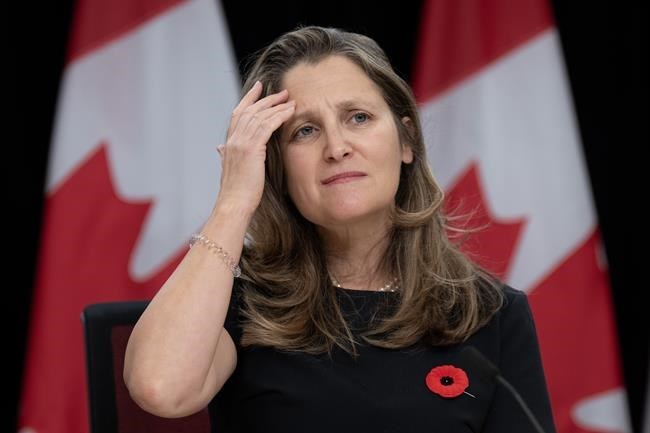TORONTO — Members of Canada’s increasingly frustrated fintech sector are calling on the federal government to move ahead with promised plans to give consumers more control over their financial data.
Dozens of tech leaders sent a letter Thursday to Finance Minister Chrystia Freeland arguing that Canada is falling behind as an increasing number of countries move ahead with open banking systems designed to increase competition.
“Open banking in Canada is long overdue,” said Nicholas Schiavo, director of federal affairs at the Council of Canadian Innovators and one of the signatories.
The system, which already exists in the U.K. and the European Union and is moving ahead in the U.S., promises to give Canadians the choice of who has access to their financial data. It would also allow consumers to move their information seamlessly from one account to another like one might move dental records when switching dentists.
Advocates say that by opening up data access, consumers can securely link everything from budgeting apps to credit assessments into their banking information.
Millions of Canadians already use services based on the sharing of such data, but it’s based on using "screen scraping" that requires them to share their login details, an unsecure and unregulated process.
The open banking option promises to increase competition in Canada’s concentrated banking sector and lower fees, said Schiavo.
“Every single day that we delay a modern, secure financial system, we are in effect putting a tax on Canadian businesses, and Canadians themselves, who are paying more for an antiquated system.”
Lori Weir, chief executive of Four Eyes Financial and another signatory, said she had hoped to see progress on the system this year.
"I certainly support anything we can do to move things more quickly."
She said that much like health data, being able to pool financial data in one place would help create better financial choices.
"It's when you bring that data together and you're able to analyze it, and able to produce back insights, that people are a bit better able to make decisions."
The letter follows the October launch of a campaign by a group of leading fintech companies to get Canadians to pressure the government to move forward on its commitments, which include a 2021 campaign promise to implement an open banking system no later than the start of 2023.
The federal government appointed Abraham Tachjian as the open banking lead in March 2022, who has since led numerous working groups, but it's still not clear when a system might launch.
Meanwhile, the U.S. announced in October that it was moving forward with plans to accelerate a shift to open banking.
The Consumer Financial Protection Bureau in the U.S. said its proposed rules would stop banks from "hoarding" a person’s data, supercharge competition and improve financial services.
“We are proposing a rule to give consumers the power to walk away from bad service and choose the financial institutions that offer the best products and prices,” CFPB director Rohit Choprsaid in a news release.
The U.K. has operated an open banking system since 2018, the same year Canada set up an advisory committee on the possibility.
This report by The Canadian Press was first published Nov. 16, 2023.
Ian Bickis, The Canadian Press



